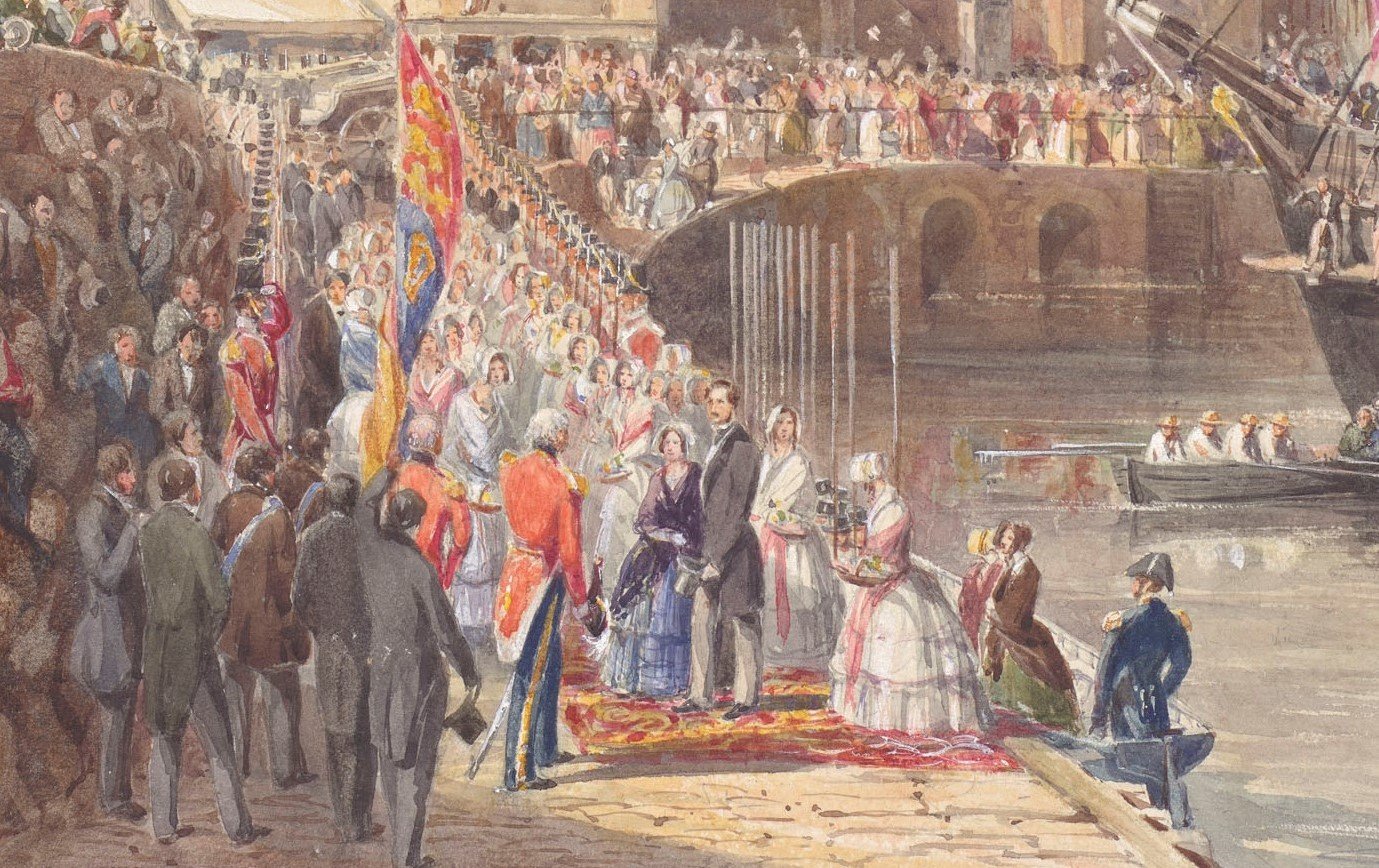
GEORGE HOUSMAN THOMAS (1824-68)
Queen Victoria at the unveiling of the statue of Prince Albert in Coburg, 26 August 1865
drawn 1865Pencil, watercolour and bodycolour | 44.5 x 34.6 cm (whole object) | RCIN 914747
A watercolour showing the market place at Coburg with the Queen and all nine of her children on the left in front of the recently unveiled statue of the Prince Consort.
Prince Albert died prematurely at the age of 42 of typhoid fever on 14 December 1861. Queen Victoria was distraught at the loss of her husband, and focused much of her energy in the subsequent years on perpetuating his memory in many different ways, such as through erecting memorials to him nationally and internationally. Victoria visited Coburg, Prince Albert's birthplace, in October 1862 to chose a site for a statue of him she wished to give to the town. It was made by the sculptor William Theed, who was commissioned to make a death mask of Albert in the days after the latter's death (see RCIN 34098 for the bust by Theed based on the death mask). The bronze statue at Coburg, which was sited in the market place, shows the Prince wearing garter robes and holding a copy of the catalogue of the Great Exhibition (which Albert played a leading role in organising). Queen Victoria attended the unveiling ceremony of the statue on 26 August 1865 - 26 August was Albert's birthdate - with the Prince's brother Ernest II, Duke of Saxe-Coburg and Gotha, and all nine of her children with Albert. The Queen wrote in her journal that it was the first time that all the royal children had been together since 1858, when the eldest (Victoria, Princess Royal) married - "& now they were all together, & the head of all was missing! Dreadful" (Queen Victoria's journal, 26 August 1865).
Thomas, who had worked extensively for Victoria and Albert, was commissioned by the Queen to travel to Coburg to record the ceremony. He also produced a watercolour depiction of the unveiling of the statue (see RCIN 920617). Thomas used existing studies for the portraits of the royal family, and drew another version of this scene from the opposite side of the square, which was published in the Illustrated London News (16 September 1865).
Prince Albert died prematurely at the age of 42 of typhoid fever on 14 December 1861. Queen Victoria was distraught at the loss of her husband, and focused much of her energy in the subsequent years on perpetuating his memory in many different ways, such as through erecting memorials to him nationally and internationally. Victoria visited Coburg, Prince Albert's birthplace, in October 1862 to chose a site for a statue of him she wished to give to the town. It was made by the sculptor William Theed, who was commissioned to make a death mask of Albert in the days after the latter's death (see RCIN 34098 for the bust by Theed based on the death mask). The bronze statue at Coburg, which was sited in the market place, shows the Prince wearing garter robes and holding a copy of the catalogue of the Great Exhibition (which Albert played a leading role in organising). Queen Victoria attended the unveiling ceremony of the statue on 26 August 1865 - 26 August was Albert's birthdate - with the Prince's brother Ernest II, Duke of Saxe-Coburg and Gotha, and all nine of her children with Albert. The Queen wrote in her journal that it was the first time that all the royal children had been together since 1858, when the eldest (Victoria, Princess Royal) married - "& now they were all together, & the head of all was missing! Dreadful" (Queen Victoria's journal, 26 August 1865).
Thomas, who had worked extensively for Victoria and Albert, was commissioned by the Queen to travel to Coburg to record the ceremony. He also produced a watercolour depiction of the unveiling of the statue (see RCIN 920617). Thomas used existing studies for the portraits of the royal family, and drew another version of this scene from the opposite side of the square, which was published in the Illustrated London News (16 September 1865).




